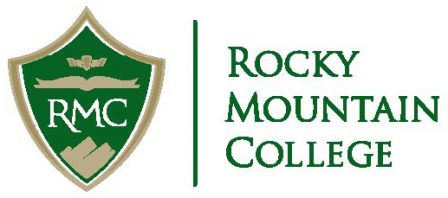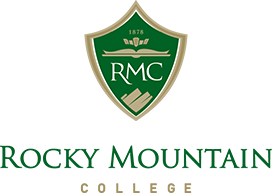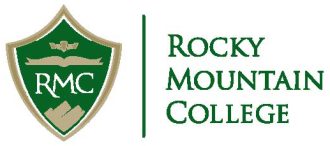Mathematics
April 4, 2022 2024-05-20 22:19Mathematics is one of the most intellectually challenging and academically pure subjects. Mathematical thought is a creative process of the mind that uses only logical deduction and established results that, in turn, have been derived from a few unarguable assumptions (axioms). Mathematical modeling is the process of critically investigating a given object (e.g., the functioning of a biological system) and of choosing or creating mathematical structures that explain the observed behavior and allow for prediction and manipulation of this object.
The mathematics program at Rocky Mountain College emphasizes both the pure and applied aspects of mathematics. At its core, its curriculum is designed to provide students with a solid foundation in the art of providing mathematically sound arguments and with a thorough knowledge of the most important modern mathematical tools and methods. In addition, the mathematics program offers elective courses that give students the opportunity to branch out and pursue their own interests. Many elective courses emphasize connections to other fields (such as computer science, engineering, finance, and the natural sciences).
All mathematics prerequisite courses must be completed with a grade of at least “C-”.
Major Learning Outcomes
Students who graduate with a major in mathematics will be able to:
- Establish mathematical results using a variety of proof techniques;
- Exhibit knowledge of relevant definitions, techniques, and mathematical results;
- Perform symbolic manipulation of high-level mathematical objects;
- Solve problems involving high-level mathematical objects;
- Solve computational problems algorithmically;
- Use advanced mathematical techniques to solve problems in real-world situations.
Major in Mathematics
A minimum of 42 semester hours is required, including:
MAT 175: Calculus I
MAT 176: Calculus II
MAT 212: How to Read and Write Proofs
MAT 275: Calculus III
MAT 310: Mathematical Statistics
MAT 311: Linear Algebra
MAT 313: Differential Equations
MAT 317: Abstract Algebra I
MAT 318: Abstract Algebra II
MAT 325: Combinatorics
MAT 330: Introduction to Statistical Learning
MAT 481: Introduction to Real Analysis I
MAT 482: Introduction to Real Analysis II
Major in Mathematics Education
A minimum of 40 semester hours is required, including:
MAT 175: Calculus I
MAT 176: Calculus II
MAT 212: How to Read and Write Proofs
MAT 220: Elementary Number Theory
MAT 275: Calculus III
MAT 306: History and Philosophy of Mathematics
MAT 310: Mathematical Statistics
MAT 312: Modern Geometric Theories
MAT 317: Abstract Algebra I
MAT 318: Abstract Algebra II
MAT 330: Introduction to Statistical Learning
MAT 422: Methods and Materials: Teaching Mathematics in the Secondary School
MAT 481: Introduction to Real Analysis I
In addition, students must complete the professional education program for secondary teaching (grades 5-12) as described in the “Education” section of the catalog.
Note: If a student majors in both mathematics and mathematics education, he or she must complete the requirements of both majors but does not need to take additional credits within the mathematics department. Majoring in both mathematics and mathematics education requires a minimum of 46 semester hours.
Minor Learning Outcomes
Students who graduate with a minor in mathematics will be able to:
- Exhibit knowledge of the concepts and techniques of calculus, including multivariable calculus;
- Correctly use mathematical notation and correctly apply elements of mathematical reasoning;
- Solve problems in areas of pure and/or applied mathematics that extend beyond calculus.
Minor in Mathematics
A minimum of 21 semester hours is required, including:
MAT 175: Calculus I
MAT 176: Calculus II
MAT 275: Calculus III
Choose three courses from the following:
Any upper division MAT course
Any course cross-listed with an upper-division MAT course
MAT 212: How to Read and Write Proofs
MAT 256: Discrete Structures and Computability
MAT 310: Mathematical Statistics
MAT 311: Linear Algebra
MAT 313: Differential Equations
MAT 317: Abstract Algebra
MAT 481: Introduction to Real Analysis I
A minimum of 6 upper-division credits is required the minor.
Minor in Mathematics Education
A minimum of 29 semester hours is required, including:
MAT 175: Calculus I
MAT 176: Calculus II
MAT 212: How to Read and Write Proofs
MAT 220: Elementary Number Theory
MAT 310: Mathematical Statistics
MAT 312: Modern Geometric Theories
MAT 317: Abstract Algebra I
MAT 422: Methods and Materials: Teaching Mathematics in the Secondary School
Electives
In addition, students must complete the professional education program for secondary teaching (grades 5-12) as described in the “Education” section of the catalog.
MAT 090 – Elementary Algebra
Semester: Fall and Spring
Semester hours: 3
This course is designed to prepare students for college algebra. Elementary algebra topics are covered, which include solving equations and inequalities, simplifying algebraic expressions, simplifying expressions involving integers and rational numbers, and graphing equations. This course will not satisfy the mathematics core curriculum requirements and will not count toward the 120 credits required for graduation.
MAT 100 – College Algebra
Semester: Fall and Spring
Semester hours: 3
This is a basic course in intermediate and advanced algebra.
Prerequisite: satisfactory score on a placement exam
MAT 103 – Mathematics for Elementary School Teachers I
Semester: Fall
Semester hours: 3
This course is a survey of various mathematical topics normally taught in grades P-8, specifically numeration systems, number theory, patterns and relationships, and fractions. This course is intended for elementary education students only. Students must earn a grade of “C-” or better to fulfill requirements for the elementary education program.
Prerequisite: MAT 100 or satisfactory score on a placement exam
MAT 104 – Mathematics for Elementary School Teachers II
Semester: Spring
Semester hours: 3
This course is a survey of various mathematical topics normally taught in grades P-8, specifically probability and statistics, geometric basic concepts and structures, measurement, and coordinate geometry. This course is intended for elementary education students only. Students must earn a grade of “C-” or better to fulfill requirements for the elementary education program.
Prerequisite: MAT 103 with a grade of C- or better
MAT 110 – Precalculus
Semester: Fall and Spring
Semester hours: 3
A standard pre-calculus course emphasizing the function concept. Special attention is paid to trigonometric, exponential, and logarithmic functions.
Prerequisite: MAT 100 or satisfactory score on a placement exam
MAT 131 – Trigonometry and Applied Calculus
Semester: Spring
Semester hours: 3
This course is available to aeronautical science majors and aviation management majors only. This course introduces applied trigonometry, vectors, and basic differential and integral calculus to model and solve real-world problems.
Prerequisite: MAT 100 or satisfactory score on a placement exam
MAT 152 – To Infinity and Beyond
Semester: Offered at discretion of department
Semester hours: 3
This course is an exploration of a variety of modern mathematical topics. Topics will illustrate mathematics as a way of representing and understanding patterns and structures as an art, as a tool in other disciplines, and as a historical force. Topics may include infinity, chaos, fractals, symmetry, networks, and others.
Prerequisite: MAT 100 or the equivalent
MAT 175 – Calculus I
Semester: Fall
Semester hours: 4
This course is a study of the functions of one real variable and includes a brief review of circular functions. The ideas of limit, continuity, and differentiation are explained and applied to physical problems. Topics include the use of approximations and problem solving. The use of graphing calculators is required.
Prerequisite: satisfactory score on a placement exam or MAT 110
MAT 176 – Calculus II
Semester: Spring
Semester hours: 4
Continuing the study of the functions of one real variable, the idea of integration is applied to physical problems. This course is an introduction to sequences and series. The use of graphing calculators is required.
Prerequisite: MAT 175
MAT 210 – Probability and Statistics
Semester: Fall, Spring, and Summer
Semester hours: 3
This course provides a non-calculus-based study of discrete probability theory and its statistical applications. Distribution theory and its applications in hypothesis testing and setting confidence intervals are discussed.
Prerequisite: MAT 100 or satisfactory score on a placement exam
MAT 212 – How to Read and Write Proofs
Semester: Spring
Semester hours: 3
Students are introduced to the different methods of mathematical proofs. Emphasis is placed on critical reading of proofs and the ability to correct errors as well as on writing correct proofs. This course is designed as a precursor to advanced mathematics courses and should be taken during the freshman or sophomore year.
Prerequisite: MAT 175
MAT 220 – Elementary Number Theory
Semester: Fall; Alternate years
Semester hours: 3
Topics in this course include axiomatic development of the positive integers, construction of the real number system, and study of equations with integral solutions. Divisibility properties, prime numbers, and the analysis of congruencies will be studied.
Prerequisite: MAT 175 and MAT 212
MAT 256 – Discrete Structures and Computability
Semester: Offered at discretion of department
Semester hours: 3
The mathematical and theoretical underpinnings of computer science will be explored. Students will be introduced to Boolean algebra and elementary logic and their application to computer implementation and algorithm development. This course explores the historical development of computer science from its roots in mathematical models including early models of computation, such as Turing machines and other finite state machines.
Prerequisite: CSC 131 or CSC 143 and either MAT 110 or MAT 175
MAT 275 – Calculus III
Semester: Fall
Semester hours: 4
Vector functions of one or more real variables, scalar functions of several variables, multiple integration, and surface theory via vectors are among the topics studied. Increasing emphasis on modeling of physical problems and the analysis of geometrical problems in higher dimensional space.
Prerequisite: MAT 176
MAT 299 – Directed Reading
Semester: Offered at discretion of department
Semester hours: 1-3
This course allows interested students to devise and pursue independent study in an area agreed upon in consultation with, and supervised by, a faculty member. Students should be either a major or minor in mathematics or mathematics education and have a cumulative GPA of 3.00 or greater.
MAT 306 – History and Philosophy of Mathematics
Semester: Fall; Alternate years
Semester hours: 3
This course provides a survey of mathematicians of historical note, including their motivations and studies. Students will also examine classical problems and how they were solved. Unsolved problems in mathematics will be discussed.
Prerequisite: MAT 175
MAT 310 – Mathematical Statistics
Semester: Spring; Alternate years
Semester hours: 3
This course is a calculus-based introduction to statistical methods and theory. The course covers basic probability rules; random variables and probability distributions; limit theorems; sampling distributions; point and interval estimation methods; hypothesis testing, including t- and chi-square tests; the simple linear regression model; and analysis of variance.
Prerequisite: MAT 275
MAT 311 – Linear Algebra
Semester: Spring; Alternate years
Semester hours: 3
This course introduces students to the basic structures of linear algebra, which include the following: matrices, determinants, vectors and vector spaces, inner product spaces, eigenvalues, and eigenvectors. Applications and computational aspects of these topics will be presented.
Prerequisite: MAT 175
Corequisite: MAT 176
MAT 312 – Modern Geometric Theories
Semester: Spring; Alternate years
Semester hours: 3
This course provides a study of Euclidean and non-Euclidean geometries.
Prerequisite: MAT 175 and MAT 212
MAT 313 – Differential Equations
Semester: Fall; Alternate years
Semester hours: 3
This course examines analytic, numerical, and geometric techniques for solving first-order differential equations; bifurcations of first-order autonomous differential equations; second-order differential equations, with emphasis on the harmonic oscillator; Laplace transforms; eigenvalue/eigenvector and geometric methods for linear systems with constant coefficients; equilibrium point analysis of nonlinear systems; and analysis of limit cycles. Applications from biology, physics, and economics are presented.
Prerequisite: MAT 311
MAT 316 – Complex Variables
Semester: Offered at discretion of department
Semester hours: 3
This is a basic undergraduate course in complex variables. Topics will include analytic functions, Cauchy’s integral formula, the residue calculus, and conformal mapping.
Prerequisite: MAT 275
MAT 317 – Abstract Algebra I
Semester: Fall; Alternate years
Semester hours: 3
This course provides an introduction to algebraic structures via group theory. Students explore a careful development of the concept of a group and elementary properties of groups. Emphasis is placed on creating mathematical proofs. Some applications to physical problems are included.
Prerequisite: MAT 275 and MAT 212
MAT 318 – Abstract Algebra II
Semester: Spring; Alternate years
Semester hours: 3
This course is an extension of MAT 317 with ring, ideal, and field theory introduced and examined. Some Galois theory may be covered.
Prerequisite: MAT 317
MAT 319 – Graph Theory
Semester: Offered at discretion of department
Semester hours: 3
Topics covered in this course include paths, Euler and Hamiltonian problems, planar graphs, trees, directed and undirected graphs, networks, and connectedness. Applications to various disciplines will be included. Computational algorithms will be developed as appropriate.
Prerequisite: MAT 212 or permission from instructor
MAT 325 – Combinatorics
Semester: Fall; Alternate years
Semester hours: 3
This basic course in enumerative combinatorics emphasizes developing combinatorial reasoning skills and applying these to solve problems in various areas of math and computer science. Topics covered will include basic counting principles, generating functions, recurrence relations, the principle of inclusion/exclusion, estimation, and modeling.
MAT 330 – Introduction to Statistical Learning
Semester: Spring
Semester hours: 3
This course introduces students to various data science and statistical methods. The emphasis of the course is on “big data” methods that focus on prediction and classification rather than the traditional statistical emphasis on estimation and significance. The software R is used for calculation and graphing.
Prerequisite: MAT 175 or MAT 210
MAT 369 – Cryptography
Semester: Offered at discretion of department
Semester hours: 3
This course covers both classical and modern ciphers, including mono-alphabetic substitution ciphers, periodic and block ciphers, and modern ciphers (e.g. the RSA method). Students will explore both theory and practice regarding the encryption, decryption and cryptanalysis of the ciphers.
Prerequisite: MAT 175
MAT 422 – Methods and Materials: Teaching Mathematics in the Secondary School
Semester: Offered at discretion of department
Semester hours: 2
This course requires focused study and consultation with a public school mathematics teacher or other acceptable professional. Hours will be arranged in consultation with the content area professor, the secondary education professor, the student, and the professional mentor. Methods of teaching mathematical content appropriate for grades 5-12 are explored. Appropriate use of technology and implications of current research in mathematics education are discussed. Current NCTM curriculum standards are used as the foundation of the course.
Prerequisite: EDC 040, admission to the teacher education program, senior standing
MAT 450 – Internship
Semester: Offered at discretion of department
Semester hours: 1-12
This course is a guided work experience. The student must arrange the internship in agreement with a member of the mathematics faculty and the Office of Career Services. Contract is required. The internship will not count as part of the minimum number of credits required in the major. Pass/no pass grading.
Prerequisite: junior or senior standing, a cumulative GPA of at least 2.00, and a major GPA of at least 2.25
MAT 481 – Introduction to Real Analysis I
Semester: Fall; Alternate years
Semester hours: 3
A proof-based course designed to establish the results in the calculus sequence from the axioms of the real-number system. Main topics include definitions and results related to limits, continuity, the intermediate value theorem, the derivative and differentiation rules, Riemann integral and Riemann-integrability, convergence of sequences and series, uniform convergence of function sequences, and power series.
Prerequisite: MAT 176 and MAT 212
MAT 482 – Introduction to Real Analysis II
Semester: Spring; Alternate years
Semester hours: 3
This course is a continuation of MAT 481. Topics include the Riemann-Stieltjes integral, uniform convergence, infinite series, functions of several real variables, compactness and metric space topology, and the implicit function theorem.
Prerequisite: MAT 481
MAT 490 – Senior Seminar
Semester: Offered at discretion of department
Semester hours: 2
Selected topics in mathematics are explored.
Prerequisite: permission from instructor
MAT 499 – Directed Reading
Semester: Offered at discretion of department
Semester hours: 1-3
This course allows interested students to devise and pursue independent study in an area agreed upon in consultation with, and supervised by, a faculty member. Students should be either a major or minor in mathematics or mathematics education and have a cumulative GPA of 3.00 or greater.
Prerequisite: junior or senior standing
- Robyn Cummings, Professor
- Ulrich Hoensch, Professor
- William Braubach, Assistant Professor
Contact
Office of Student Records
Rocky Mountain College
Prescott Hall
1511 Poly Drive
Billings, MT 59102



